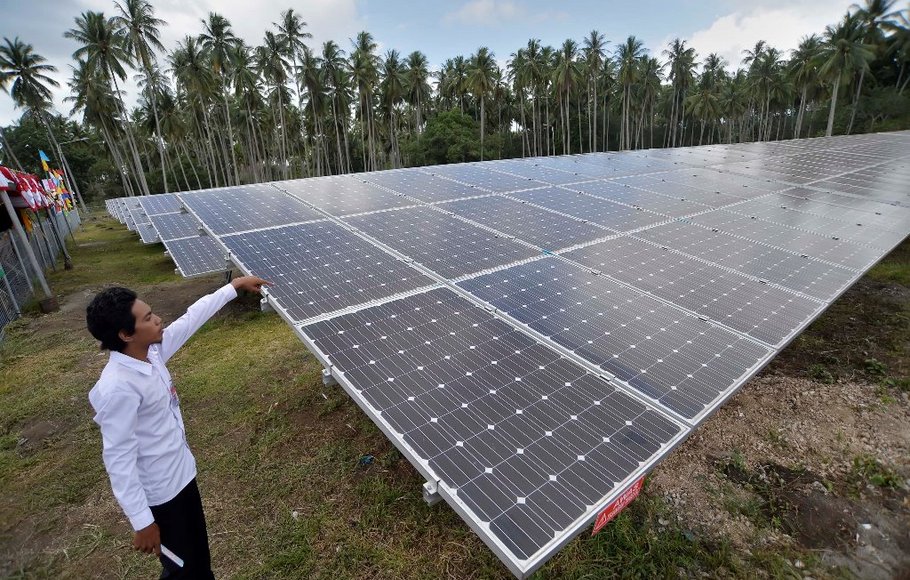One observation from the presidential debates is that neither candidate has outlined a vision on how to tackle the biggest social and economic challenge of our time: climate change.
This is surprising, because one can think of various reasons to champion climate policy and green growth issues.
First, advocating for a climate-resilient economy is a viable political strategy that resonates particularly well with an important group of voters: Millennials and the Gen Z generation. Global surveys conducted by the World Economic Forum and Deloitte, which include respondents from Indonesia, show that climate change belongs to the top five major issues young people are most concerned about.
Their concerns are well founded because the scientific evidence for global warming is clear. The latest report by the Intergovernmental Panel on Climate Change (IPCC) shows that the earth is well on course to warm between 1.5⁰ and 2⁰ Celsius above pre-industrial temperatures in this century. Carbon emissions from human activities is the main cause for global warming. The world needs to cut emissions fast in order to keep global temperature increases to below 1.5⁰ Celsius in order to avoid the worst impacts.
Second, joining the global fight against climate change makes strategic and economic sense because Indonesia, as a maritime nation and a large natural-resource-based economy, is particularly vulnerable to climate-related risks. The IPCC predicts that extreme weather events will become more frequent: sea levels will rise, the agricultural sector will face smaller crop yields, more deaths will occur due to heat-related causes, and shortages in water supply will be severe for many regions. These risks threaten to increase poverty levels and security risks in many countries, including in Indonesia.
Third, for a long time Indonesia has been an active player in global climate diplomacy. For example, Indonesia hosted the UN-led Climate Summit in 2007 as part of a process that led to the 2015 Paris Climate Agreement. By signing this agreement, Indonesia has committed to GHG emissions reduction targets under its Nationally Determined Contributions (NDC).
Fourth, Indonesia has adopted sustainable development as a guiding principle in many of its strategic plans. Under the Paris Agreement, Indonesia has committed to reduce GHG emissions by 29-41% from the BAU scenario by 2030. The realized targets depend on the extent of international funding. But the point here is that climate policy targets have guided the national policy planning process and will be mainstreamed in the upcoming National Medium-term Development Plan 2020-2024 document.
Thus, despite the acceptance of climate policy goals as part of the national strategic rationale, mainstream politics seems to shy away from engaging the public on climate change issues.
Maybe the leading politicians in this country still perceive climate change to be a ‘first world’ problem. Accordingly, the costs of climate policies should not be burdened on emerging economies like Indonesia but on the rich economies that contributed most to global warming.
But this is a short-sighted view. To be clear, climate policy will incur some short-term costs because a commitment to emissions reduction requires a change in the way the economy works. A new model is needed based on green growth, namely growth that produces economic progress and reduces GHG emissions at the same time. This will require a mixture of rapid technological innovation, sustainable infrastructure investment, and increased resource use efficiency.
However, we also need to recognize that Indonesia’s growth model is not sustainable and is already very costly, as it relies heavily on resource extraction and a high-carbon energy sector. Degradation of forests and peatland and the high share of fossil fuels in the energy mix have made Indonesia the 4th largest emitter of carbon dioxide in the world. The Low Carbon Development Indonesia (LCDI) initiative reports that once the costs of resource depletion and air pollution are factored in, Indonesia’s natural capital base has been reduced by 791 Billion US$ between 2000-17. This equivalent to 78 percent of 2017 GDP. Relying on the conventional economic growth model will be even costlier in the future.
Adopting a new green growth vision for Indonesia, therefore, is an opportunity to invest in the future, yielding potentially huge economic benefits.
Globally, the New Climate Economy estimates investment opportunities related to climate action could yield a global direct economic benefit of USD 26 trillion and generate 65 million green jobs by 2030.
In Indonesia, the upcoming Low Carbon Development Report by Bappenas projects that green growth policies can be implemented to produce an average growth rate of 6 percent a year until 2045 and at the same time reduce carbon emissions by 43 percent compared to business as usual.
Financial markets are already lining up to fund green infrastructure investment. The global green bond market has reached a size of around 155 Billion US$ in 2017.
Indonesia can be regarded as a pioneer among the emerging economies by issuing green bonds worth 2 Billion US$ in 2018, thereby tapping into the international market’s growing appetite to invest in sustainable infrastructure development.
So green growth is a feasible option and the financial resources are available. But despite some progress, Indonesia lags behind the investment rates of large emerging economies such as China and India. The former is already global leader in the electric vehicles and solar power, while the latter expects to more than double its renewable energy capacity between 2018 and 2022.
In a nutshell, global markets are already on their way to de-carbonization. It would be good to hear from our leaders about their plans to ensure that Indonesia will fully benefit from the future global green economy. [Author: Kurnya Roesad – GGGI Indonesia Lead Economist and Program Lead for Special Economic Zones and Green Cities]
* This opinion editorial by Kurnya Roesad was originally published in Bahasa Indonesia in Antara News on March 31, 2019: https://www.antaranews.com/berita/818096/pentingnya-pertumbuhan-hijau-bagi-pemilih-indonesia
